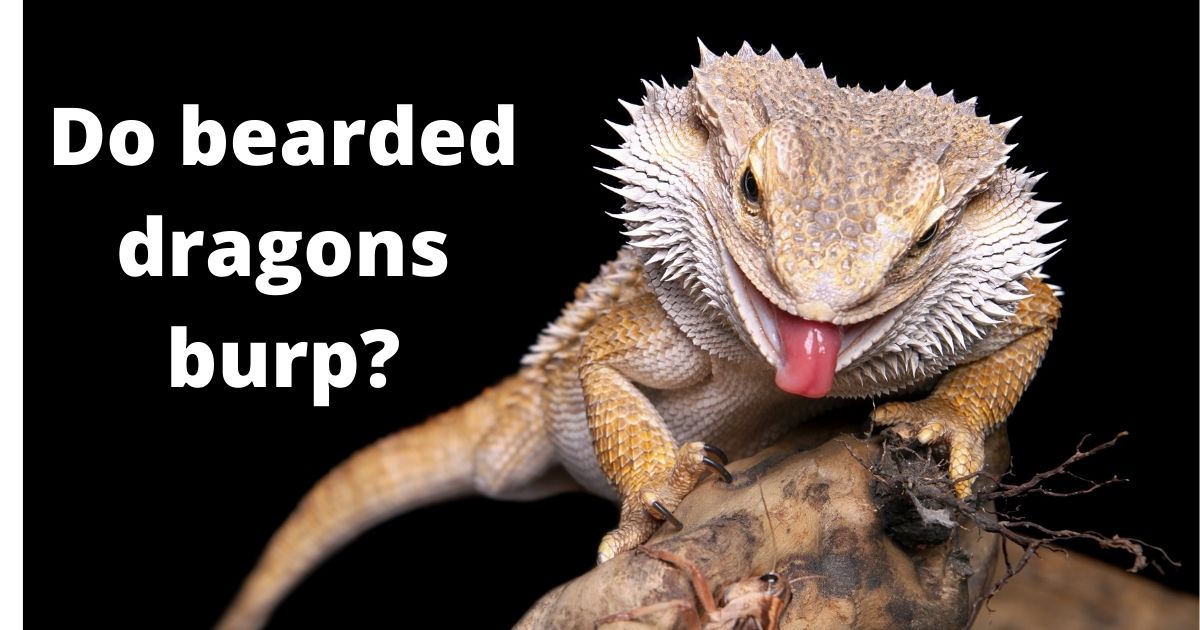As an affiliate, we earn from qualifying purchases on Amazon. We get commissions for purchases made through links in this post.
Regularly, you might encounter your bearded dragon puffing out its beard a little, then begin burping. It is harmless and a natural phenomenon for bearded dragons to burb. In this article, we will discuss whether bearded dragon’s burp.
In most cases, overfeeding bearded dragons’ is to blame. The moment you overfeed your pet (bearded dragon), it swallows excess air as it is feeding.
Additionally, when bearded dragons overfeed, they may experience indigestion. This causes them to build up gases which make them burp. Most individuals inquire whether various food types cause burping in bearded dragons.
According to my information, there is no particular type of food that causes burping to your bearded dragons. However, it is crucial not to overfeed your bearded dragons to prevent gas build-up, which makes them burp.
Burping is linked to an excess of gas in the upper GI tract. It can be caused by the dragon’s diet, gastrointestinal diseases, dysbiosis, or foreign substance ingestion, to name a few. You could also administer them simethicone by mouth (0.25 ml every 6-8 hours as needed). Mylikon drops are my favorite.
Do Bearded Dragons Burp?
Bearded dragons usually burp to remove intestinal gas from their bodies. Sometimes they have distension in their stomachs and need to burb and receive a feeling of relief. Gases that cause the bearded dragons to burp are the meal they consumed or other bacteria inside their tummies.
The building up of gases in their stomachs is obtained in two significant ways. Firstly, gases can build up in bearded dragons when feeding and swallowing air. These gases include oxygen and carbon dioxide.

Prolee Reptile Terrarium Tank Large Size
- Pet and Human Safe Materials
- Front & Roof Door With Side Louvers
- Pre-Installed Bulb Sockets With Switches
Secondly, gases can be built up by gas-producing bacteria inside their stomachs. Gases produced by bacteria include hydrogen sulfide, carbon dioxide, and methane. When the intestinal gases build up, they may distend the belly of your bearded dragon. Like humans feel when their stomach is bloated, bearded dragons feel the same.
Hence, they need to remove these gases by either burping or farting. The beaded dragon burp is both natural and physiological. They feel relieved when they release gases through burping.
You May Also Like: Can You Smoke Around Bearded Dragons + 10 Negative Effects
Does the Bearded Dragon Burp Excessively?
Since they are reptiles, bearded dragons tend to fart and burp less compared to humans. If your bearded dragon burps way more often, there is something wrong with your dragon.
You might think your dragon is burping, but it is coughing to remove fluid found in its lungs. They are choked when drinking excess water or taking a bath.
It is essential to pay attention to what your beardie is doing and avoid severe damage. Chocking occurs when fluid fails to enter their intestine but instead enters their lungs. Mostly, problems like lung infections may occur due to choking. It is advisable to take your bearded dragon’s reptile veterinarian and have it evaluated professionally.
You May Also Like: How to Destress a Bearded Dragon + 4 Easy Tips
Other Bearded Dragon Noises
Bearded dragons produce various types of noises. These noises may range from hissing, chirping to huffing noises. Below are some of other noises bearded dragon make and what it means for your beardie.
Let’s now find out what each of these bearded dragon’s noises really mean.
Hissing Noises
The first is hissing noises. Bearded dragons make hissing sounds to signify that something is not correct. Reptiles make hissing sounds if they are scared, in danger, or if something unusual invades their habitat. They will make these sounds when they feel threatened and feel that they are not safe and wants your intervention.
It is also common to hear hissing sounds before the bearded dragons bite you when you hold them too close to their bodies or faces. It is also important to note that hissing noises accompanied by turning black or beard puffing up signifies that your dragon is in danger. If you fail to leave them alone when you see these signs, you will probably be attacked trying to defend yourself.
You May Also Like: Why is My Bearded Dragon Running Around Like Crazy
Chirping Noises
This sound can be rarely heard as the bearded dragons make it when yawning. Chirping noises are usually associated with happiness sounds.
Clicking Noises
They make this sound by snapping their jaws. Such sounds are made when your dragon opens its mouth while clamping down an object like food. You’ll probably hear lots of this clicking noises when they are feeding or enjoy their favorite snack.
Huffing Noises
These noises are almost like coughing and are made by the dragons to intimidate animals nearby, human beings, or another dragon they are not used to or familiar with.
Croaking Noises
Croaking noises are similar to clicking noises and can only be heard when the bearded dragon is breathing. Sometimes these croaking noises could be a sign of respiratory illness.
The croaking sound is produced when your beardie’s lungs contract and push air out. The sound will also be produced by your beardie when their throat swells due to some infection causing inflammation or irritation. Your bearded dragon will then have trouble breathing causing them to make the croaking noises until the situation improves.
You should aim to have your beardie checked by your local vet as soon as possible, to prevent any further damages to your beardie’s throat.
You May Also Like: Can I Put Calcium in My Bearded Dragons Water (Is It Safe)
Conclusion
Burping is a physiological function that bearded dragons use to eliminate stomach gases. It is characterized by increasing gases from both outside and internal sources. Although reptiles fart and burp less than people, this can be observed occasionally.
The bearded dragon eliminates these gases that build up from bacteria or swallowing air through farting and burping. Lastly, limiting your bearded dragon from drinking a lot of water is essential since they do not stop when needed. This would help them avoid lung infection and burping.
Unless your bearded dragon burps excessively and appears unwell, there’s no reason to be concerned. Also, bearded dragons may burp as a result of overfeeding. If overfeeding is evaded, then your bearded dragon will have fewer burbs. Also, check to ensure that your dragon is not coughing from choking. Therefore, bearded dragons burp, and you should not be worried as it is a normal process for animals.

